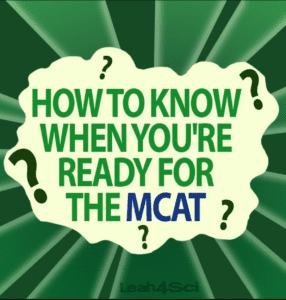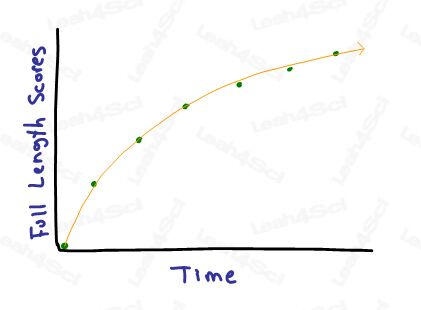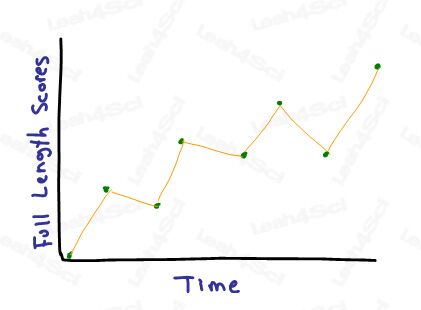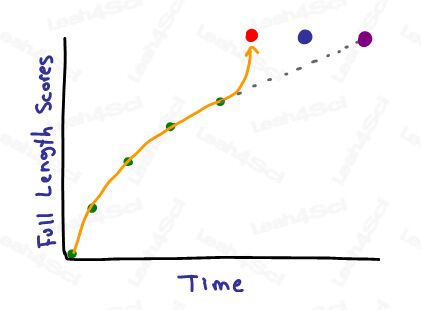 You’ve already invested years into your Med School prerequisites and months into preparing for the MCAT, but are you ready to test?
You’ve already invested years into your Med School prerequisites and months into preparing for the MCAT, but are you ready to test?
How do you know when you’re ready to take the MCAT?
WHEN you take the MCAT is nearly as important as getting the right score.
If you’re applying to schools with rolling admissions (most US schools), then the sooner you apply the greater your chances are of getting accepted.
However, if you test before you’re ready you will have two problems:
you have to retake your MCAT AND you have a low score on your record.
While taking the MCAT multiple times won’t prevent you from getting into med school, it will count against you to some extent.
I work with many nontraditional students who find me AFTER their first (or second/third) MCAT attempt.
When I ask them why they tested, especially for those who felt ready, I hear everything from,
“I put in so many hours to prepare, I had to be ready.”
“I have a Biology (chemistry, biochemistry…) degree and felt that would help me”
“I just finished my prereqs and did very well in those classes”
to “My advisor told me I should.”
And many more reasons that boil down to a few things:
- Students felt they were ready – just a gut feeling.
- Students hoped they were ready.
- Students assumed they were ready.
All of these evaluations have their place in determining your readiness for the MCAT, but there’s one thing missing…
Data!!
As a future doctor you must be a scientist at heart.
If a patient shows up to your clinic presenting various symptoms, you as the doctor/scientist must use your judgement when evaluating the patient.
You must look at ALL the facts and evaluate the data.
Your MCAT journey is no different.
It’s not Magic, It’s Math!!
Read this if your plan is to test early so that you can retest if unhappy with your scores.
When a student asks me “Leah, do you think I’m ready for the MCAT?”
I look at 3 things (#3 is most important!).
- Content completion
- Student’s gut feeling
- Full-length score data trends
Let’s start with content.
While the MCAT is NOT a content exam, a very extensive content foundation is required to do well on this exam.
The MCAT tests the equivalent of three years worth of undergraduate science including physics, general chemistry, organic chemistry, biochemistry, biology, psychology and sociology.
I teach my students to approach MCAT prep with 3 distinct Phases, where Phase 1 is all about building a solid content foundation.
Question 1: Did you complete all of your MCAT content (at 80-90% mastery?)
This is a very simple yes or no.
If you haven’t yet completed content, watch the video below to figure out how much time you need to complete Phase 1 – the content phase.
Question 2: How do I feel going into the MCAT?
While the final determination will come from the numbers, we can’t ignore the human being (you) taking this exam.
If you think you’re ready for the MCAT, ask yourself the following questions before AND after evaluating your numbers:
How do I feel about the MCAT? Do I feel ready?
Keep in mind that while you’ll never feel 100% ready, you’ll still know if you’re definitely NOT ready.
Do I feel confident with my ability to sit through a 7.5 hour exam?
If not, read this: How to Build Endurance for the 7.5 Hour MCAT
Do I feel confident with my overall timing approach to individual passages and each section of the exam?
Timing is key! No matter how well you know the information, if you run out of time you WILL miss questions.
If timing is an issue for you watch my MCAT Timing Strategy for CARS and Science Passages video.
Do I feel confident with the overall flow of the exam?
Meaning, have you taken enough full length practice tests under realistic testing conditions to the point where you know exactly what to expect AND how you’re going to approach each passage?
Will I ever feel ready for the MCAT?
I bet you expected a magical ‘yes, when x, y, z happens and the stars align…’
Realistically, no one ever truly feels ready for the MCAT, but you still want to have a ‘somewhat yes’ answer to the gut feeling questions above in addition to the most important of all.
If you're doubting your abilities and asking yourself, “Am I smart enough to be a doctor?”,
Stop and watch this video now!
Question 3: Do the numbers tell me that I’m ready for the MCAT?
This is the final piece of the ‘am I ready for the MCAT?’ equation which I teach in this video and elaborate below.
The best way to evaluate your readiness for the MCAT is by studying the trends of your full length practice tests.
If you haven’t taken a single FL (full length) yet, read this: The Best Time to Take Your 1st MCAT Practice Test
If you’ve taken a handful of exams, let’s evaluate your scores and compare them to your target.
You do have a target score, right?
Doing well on the MCAT is not about ‘scoring as high as you possibly can.’
Instead, I want you to be very deliberate about choosing a target score.
Choosing your MCAT target score
Research the average accepted MCAT scores for your top 3 medical schools.
Your top 3 REALISTIC medical schools.
For example, everyone and their mother is hoping to attend NYU because of their free tuition.
But if you have a 3.0 GPA and scored under a 510 on your most recent practice test, then this may not be the school to base your targets off of. (I'm not saying to rule it out, just don't use THIS to create your target).
Consider aiming for 2 points ABOVE the average accepted scores for your target schools. This makes you slightly more competitive from the MCAT score angle.
That’s your target,
Now let’s compare.
The math will be different if you’re just days/weeks out from your test date compared to having many weeks or months till your chosen MCAT date.
If your MCAT is in less than 1 month:
This is it, you’ve long since completed content.
You’ve taken numerous practice exams and already answered ‘yes’ to all of the gut feeling questions above.
Now it’s just a question of the numbers.
Promise to be 100% honest and realistic with your evaluation. Better to know NOW than after your scores come in.
Take a look at your last 3 full-lengths, ideally taken in the last month or two.
- Are your scores relatively consistent?
Not just your overall score, but also your section scores. - If they’re not consistent, why not?
What exactly has you jumping all over the place?
Or better yet, what’s it going to take for your scores to even out?
We need consistency for predictability.
(Consistency is scoring within 2-3 points on each exam.)
Take the average of your 3 most recent full-lengths, deduct 2 points for ‘test day nerves’, and ask yourself this:
If this is my score on test day, what is my immediate reaction?
- Am I happy with my score and excited to apply?
Go for it! - Am I unhappy with the average?
How unhappy?
Is this a good enough score to apply despite not meeting personal expectations?
Work really hard the next few days and go for it. - Estimated score just won’t cut it and will force a retake?
Read this ASAP: Should I Retake my MCAT? If so, When?
Let me reiterate,
It’s better to know and accept the truth NOW before you’re stuck with this score on your record, than to sit through the exam hoping for the best despite knowing you’re not ready, waiting on pins and needles for 30 days to get your scores, then going through the 5 stages of grief when you realize you scored too low, and then being forced to retest.
Of course, you might be in a situation where you need to buy yourself only a little more time to prepare. Hoping to apply BEFORE taking the MCAT?
Read my best advice here: Applying to Medical School Before the MCAT
If you’re reading this weeks or months out from your test date
Let’s back up to question #1
Worry less about “will I be ready for some arbitrary date?” and focus more on
“What does a solid 3 phase plan look like so that I CAN be ready by my chosen test date?”
Look at my Sample 6 Month MCAT Study Plan, and Sample 3 Month MCAT Study Plan to help guide you in creating something more custom for you.
Creating customized plans is just one aspect of what we work on together in the MCAT Study Hall.
The first step is to complete content.
Use the first video above to estimate your Phase 1 timeline before worrying about anything else.
Once you’re near the end of Phase 1, take a look at your overall test day projections.
Have you taken at least 3 full-lengths yet?
If yes, let’s run the following calculations.
- What was your FL score jump from exam 1 to 2?
- What was your FL score jump from exam 2 to 3?
If you have a smaller second jump, use that number.
Why? Most students see very big jumps during the content phase due to being able to answer many more questions that simply require content or equation information.For example, if you scored a 489, then 493, then 495, you jumped 4 points between FL 1 and 2, but only 2 points between FL 2 and 3.
These are realistic numbers from one of my MCAT Study Hall members.
You probably won’t see a 2 point jump every FL moving forward, but let’s go with it for now.
Assuming that once you finish content you will take 2 full-lengths per month, and assuming you jump a max of 2 points each time, that's an increase of up to 4 points each month.
Let’s say you’re evaluating this 3 months out from test day.
That’s a max of 12 points (4 per month x 3 months) and a jump from 495 to 507.
Now remember, that’s not a 507 MCAT score,
That’s a 507 in practice.
Deduct 2 points for test day nerves!
Most students are so nervous it takes them some time to get into the zone on test day.
Instead of panicking over the lost points, build them in as a buffer.
And hey, if you DON’T panic on test day and DON’T burn your buffer, then bonus! you just earned an even higher MCAT score!
507 in practice, minus 2 buffer points = 505
Be 100% honest with yourself,
If you scored a 505 on test day, would you retest or apply?
For some students, this is a ‘heck no’ to applying, because 505 won’t even get them an interview.
But for other students (like many of mine who are currently in med school) a 505 is considered GOOD ENOUGH!
This is why researching your target score is SO important before starting any of this.
If the answer is yes,
It’s only a temporary yes.
In addition to reviewing every full-length in great detail, make sure you run these calculations again, and ask yourself the difficult questions each time.
A few more notes about evaluating your MCAT readiness:
While we hope and expect the MCAT full-length timeline to look something like this:

Most students have a timeline that graphs something like this.

That’s ok.
Evaluate each exam, not only for your overall and section scores, but also for the lessons learned.
If you had a really bad day, forgive this score and rule it out as an outlier.
If you have a surprisingly GOOD practice score, ask yourself, “Did I really jump up this much, or was this score a fluke?”
The last thing you want to do is hang your hopes on a fluke due to an easy full-length, or scoring very high when retaking an exam you’ve seen before.
Also, remember that every full-length company is different in terms of the quality, as well as how close/reflective they are to the real thing.
In speaking to many students after their MCAT, I’d rank 3rd party full lengths as follows:
AAMC > Next Step > Altius > Gold Standard > Examkrackers > Kaplan > Princeton
This is why I recommend Next Step to my students, and also why I asked them to give you a discount. (Get the 10% NS discount code on my MCAT Resources Page)
I don’t have enough positive student feedback on the other companies to include them here.
Most, MOST, MOST important is to be realistic!
If you saw a graph like this on your MCAT, perhaps mapping the growth of a certain organism or other experimental value,
Would you expect the next data point to be the Red, Blue, or Purple dot?
Hopefully, you chose purple.
Yet, when plotting their MCAT full length scores, many students see the graph, understand the curve, and yet hope to somehow hit the red point.
It’s just not realistic.
So track your scores as I explained above, and only test once you’re absolutely ready.
For more on this topic read: 2 Reasons Students Retake the MCAT – How YOU Can Avoid it


